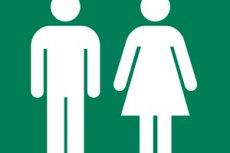Medical expert of the article
New publications
Back pain after defecation and urination
Last reviewed: 06.07.2025

All iLive content is medically reviewed or fact checked to ensure as much factual accuracy as possible.
We have strict sourcing guidelines and only link to reputable media sites, academic research institutions and, whenever possible, medically peer reviewed studies. Note that the numbers in parentheses ([1], [2], etc.) are clickable links to these studies.
If you feel that any of our content is inaccurate, out-of-date, or otherwise questionable, please select it and press Ctrl + Enter.

Bowel movements are accompanied by painful symptoms in case of pararectal abscess (paraproctitis), especially often the pain arising in the rectum radiates to the back in case of ischiorectal location of the abscess. The inflammatory process has a sudden onset. The pain is paroxysmal in nature and becomes more noticeable with any movements. Defecation is especially painful, the patient's temperature rises and he has a fever.
The process of sciatic-intestinal localization quickly spreads vertically, capturing the pelvic tissue. The patient's condition quickly worsens.
The cause of back pain can also be a submucous abscess of the rectum, which is most often localized on its back wall. The nature of the pain is aching, dull, sometimes cramping. It intensifies during bowel movements. The temperature is usually elevated, if slightly.
Acute pains radiating to the back during and after defecation are caused by the presence of an anal fissure, if it has appeared recently. They are very intense, but short-lived. They are felt during bowel movements for about a quarter of an hour after the act. With an acute anal fissure, there is a strong spasm of the sphincter, hemorrhagic manifestations are usually small. Without treatment, the fissure can become chronic, while the intensity of pain decreases, but they can bother without defecation, increasing during it and immediately after.
Painful attacks in the anus, bursting, radiating to the back during and after bowel movements, accompanying walking, running, felt when sitting are signs of the onset of an acute attack of hemorrhoids, when the hemorrhoidal node is pinched. The sensations are very intense, sometimes they are simply unbearable, since there are many nerve endings around the anus. Often the patient can neither sit nor walk. Lumbar pain is felt in the sacral or coccygeal area, as a rule, with advanced hemorrhoids, since the blood clots formed in the prolapsed node become too large, which disrupts blood flow, stagnation occurs. Advanced hemorrhoids can be complicated by necrosis of the nodes. Back pain usually appears when the patient has spent a long time in one position.
Back pain after defecation may also indicate problems with the spine in the lumbosacral region, which is strained during bowel movements (osteochondrosis, tuberculous spondylitis). Their cause can only be determined together with a doctor, after undergoing an examination.
Back pain after urination
If the process of emptying the bladder is accompanied by back pain, first of all, blame kidney inflammation. Such a complication can occur after acute respiratory viral infection, flu or cold. Pain and frequent urination reminds of cystitis or urethritis. This is true, inflammation of the urinary organs, as a rule, causes pain impulses in the lower back, pain in the urethra, frequent scanty and incomplete emptying of the bladder. Headache, fever, general malaise may occur.
Back pain and bladder emptying problems may also indicate urolithiasis; the same symptoms are caused by neoplasms of the urinary organs. Therefore, to clarify the diagnosis, you need to see a urologist.
Tuberculous spondylitis of the lumbosacral region manifests itself, in addition to other symptoms (weakness, subfebrile temperature, nausea and headache), and urination disorders. Pain in the lumbar region increases during and after emptying the bladder.
Osteomyelitis manifests itself as back pain and urination disorders; it must be differentiated from kidney diseases, since the symptoms are similar.
When back pain occurs after urination, you need to see a doctor, and if the symptoms are acute - high temperature, severe pain, blood in the urine, signs of dehydration, swelling, then you need to call an ambulance, since such signs indicate a life-threatening condition for the patient.


 [
[